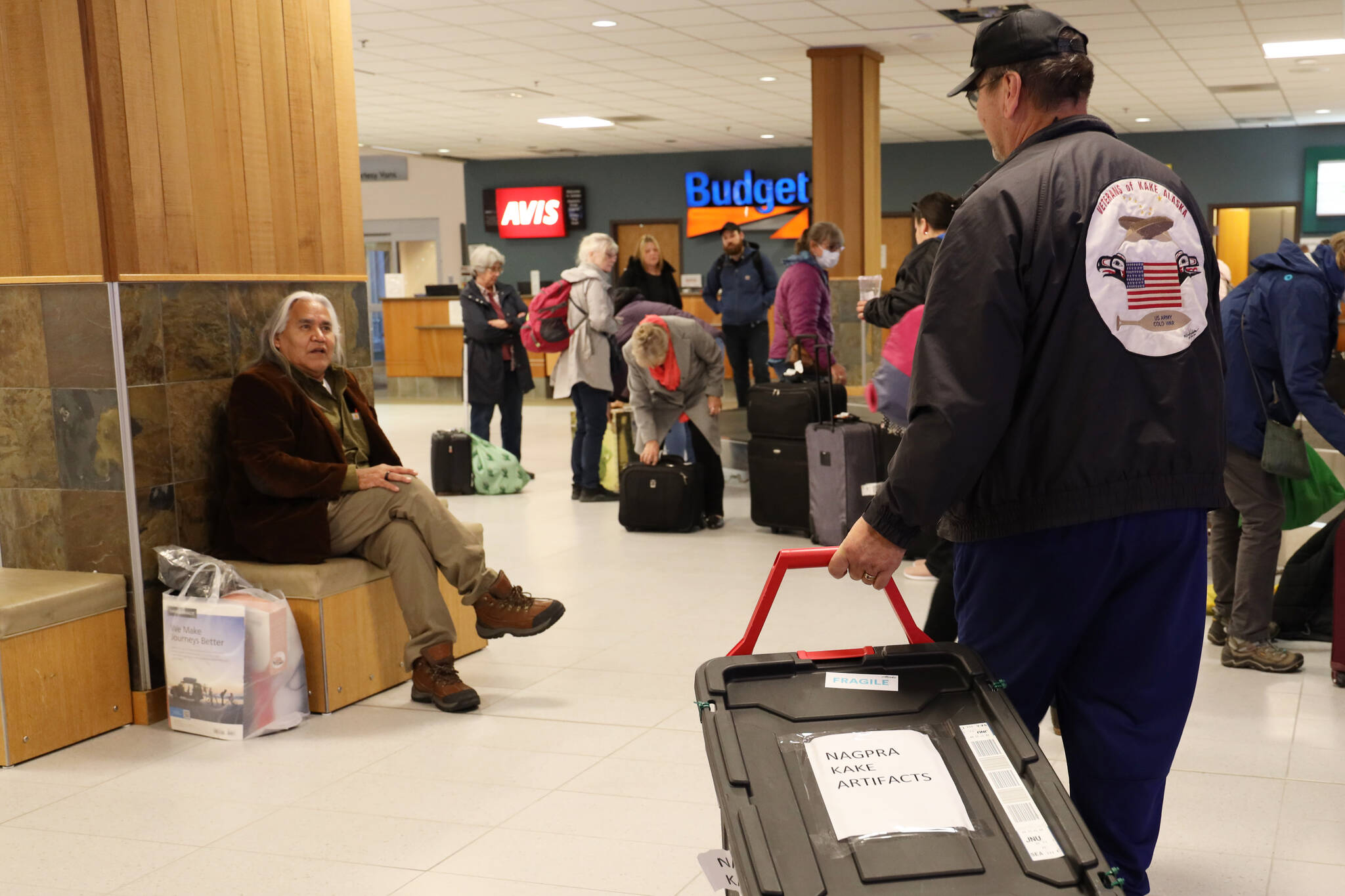This award-winning article has been placed in front of the Juneau Empire’s paywall.
Nearing the end of his flight from Seattle to Juneau, Frank Hughes looked out his plane window to the ground below where the outline of the Organized Village of Kake slowly appeared beneath him.
An excitement built in him, one that he said made him feel like his heart had just skipped a beat. Though Hughes has lived in the small Southeast Alaska Native village for years and has come and gone from it too many times to count, this time was different — because he wasn’t alone in coming home.
In the belly of the plane sat a sturdy black bin locked by zip ties and scattered with fragile stickers holding 25 Alaska Native artifacts ranging from spruce root-woven baskets to ceremonial paddles to headdresses that were taken from the village in the early 1900s.
Many of the pieces are estimated to be more than 200 years old.
“We’re going home,” Hughes said. “These artifacts are coming home.”
Since 2018, Hughes has worked to bring the collections of artifacts that were found at George Fox University in Oregon back to Kake after discovering their existence while doing research for the Native American Grave Protection and Repatriation Act for which he served as coordinator. Hughes said during his work for NAGPRA he had done many Indigenous artifact repatriations across the country, but said he couldn’t believe it when he came across the artifacts from Kake.
Now, after nearly five years of waiting, Hughes, along with Lincoln Bean, vice chairman for the Organized Village of Kake, flew to the university earlier this week to retrieve the artifacts and bring them home. The pair and the bin of artifacts made stops in Seattle and Juneau Wednesday and Thursday before heading to Kake Friday.
“When I looked at them, it was like looking at my past and my elders,” Bean said. “It’s some of the most beautiful art of weaving, headdresses I’ve never seen before. The apron for dancing, with some of the most intricate, beautiful beadwork you’ve ever seen in your life.”
As for how the collection of this small Southeast Alaska village’s cultural artifacts ended up nearly 1,000 miles away stored off-display at what bills itself as the No.1 Christian college in Oregon is up for debate, Hughes and Bean explained.
The pair said they believe that some of the artifacts may have been given as a gift to visitors of the village, however, they said it is more likely s that most were taken by the Religious Society of Friends in Alaska — also known as Quakers — who built a mission in the village in late 1891 before leaving after the building was handed over to the Kake Memorial Presbyterian church in 1912.
“They cut it out and took it,” Hughes said about a wooden mask that was a part of the collection of artifacts repatriated. The piece was likely the oldest of the collection and served as a marker on a tree identifying the territory. He said the mask would have to have been cut out of the body of the tree in order to be removed.
Quakers were missionaries in Alaska who during the 1800s and 1900s ran about 30 boarding schools for Indigenous children in the U.S. and its territories, including the Douglas Island Friends Mission School on Douglas Island.
Quakers were a part of the historical movement in which many Alaska Native children were sent away from their families, communities and culture to boarding schools in the state — or across the country — and were forced to divorce themselves of their Indigenous identity in exchange for U.S. values and culture.
Though many of the boarding schools were closed by the late 1900s, the legacy of trauma and abuse from these schools still remains for many Alaska Native families and communities.
Hughes said though the pain still permeates from the past, repatriation serves as a way to bring healing to both the people living in Kake today and the spirits that live within the artifacts.
“We’re just trying to bring them home where they came from,” Bean said.
Hughes said when he first saw the artifacts in Oregon, he knew immediately that the spirits of his Tlingit ancestors were there with him.
“When we opened it up, the excitement and the spirits were alive, it’s like walking in an air-conditioned room — the spirits came alive,” Hughes said. “It’s good to see you, we’re happy to see you.”
Bean agreed, and said the Tlingit culture is a gift from god and bringing home these items gives him a glimpse of his culture he didn’t know was missing.
“I’ve never seen anything like this,” Bean said. “It’s powerful looking back on people we know that were here before us — as a family, as a tribe — and it’s tangible, we can touch it.”
Hughes said he and Bean would present the artifacts — still unopened — to the village. Plans to open the box and welcome the artifacts homes will start but won’t likely happen until after Thanksgiving.
Bean and Hughes said that the repatriation serves as a step toward healing and rebuilding the parts of their culture that were taken.
“We know who we are, we know where we come from, we know where we’re going,” Bean said.
• Contact reporter Clarise Larson at clarise.larson@juneauempire.com or (651)-528-1807. Follow her on Twitter at @clariselarson.

